Universal Periodic Review 46th Session
Review of Eritrea – Fourth Cycle
6 May 2024
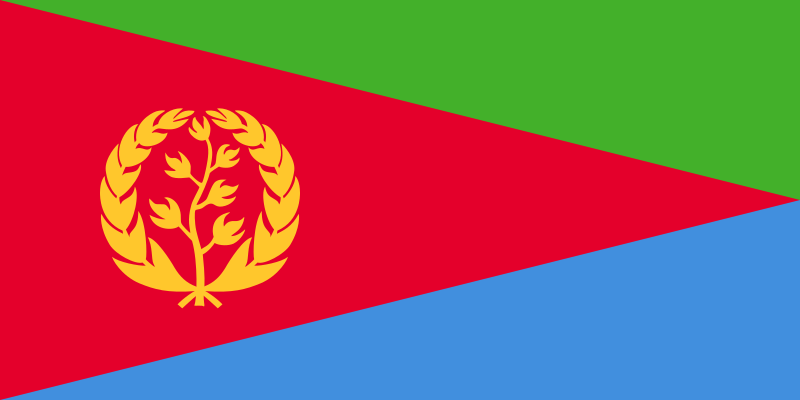
By: Marisa Were / GICJ
Executive Summary
The 46th session of the Universal Periodic Review (UPR) fourth cycle was held for Eritrea on 6 May 2024. The delegation of Eritrea was led by Mr Habtom Zerai, First Secretary, Chargé d’affaires a.i. of the Permanent Mission of Eritrea to the United Nations (UN) and other international organisations in Geneva, who was accompanied by colleagues from the Ministry of Foreign Affairs, the Ministry of Labour and Social Welfare, the National Union of Eritrean Women (NUEW), and the Permanent Mission in Geneva. During the review, the delegation of Eritrea began by summarising the implementation status of the recommendations mentioned in the national report before listening to the interactive dialogue and then addressing the questions advanced by participating countries.
During the interactive dialogue, participating countries provided several recommendations for Eritrea to consider. Key topics for the recommendations discussed were discrimination in education, the Convention Against Torture, the death penalty, the conscription of school-aged children, indefinite national service practices, and the lack of cooperation with the Special Rapporteur and UN working bodies and international organisations.
Geneva International Centre for Justice (GICJ) recognises Eritrea’s efforts to improve human rights conditions. However, it reiterates its concern over aspects of torture, indefinite national service, the death penalty, and the lack of international organisation cooperation to ensure that human rights are being upheld. GICJ urges the country to continue improving its human rights conditions in all areas and cooperate further with international bodies and organisations seeking to assist in these endeavours.
Background
The Universal Periodic Review (UPR) was established in 2006 by the UN General Assembly in resolution 60/251 and aims to improve the human rights situations of UN Member States. It does so by supporting, promoting, and assessing the State’s human rights records to address violations and protect human rights on the ground. Each cycle of the UPR allows States to reflect on their progress and challenges. Eritrea has been through four cycles: the first in November 2009, the second in February 2014, the third in January 2019, and now the fourth in May 2024.
In February 2024, in accordance with the Human Rights Council (HRC) resolutions 5/1 and 16/21, Eritrea submitted its national report (A/HRC/WG.6/46/ERI/1). Having supported 131 and noted 130 recommendations from the previous 2019 report, the 2024 report addressed the implementation status of supported recommendations covering the period of 2019 - 2023. Notably, Eritrea highlighted improvements in the access to education within jails and rural areas, the increased numbers of health facilities throughout the country, the improved equality for women in education and health, and the improved national legal system regarding educating on law and proper processing of crimes. In addition, the report acknowledged the challenges the State has faced, such as climate change-induced droughts and the impact of sanctions on the State's development trajectory, which led to the non-implementation of 19 supported recommendations.
The report prepared by the Working Group of the UPR raised concerns about the scope of international obligations and cooperation, the national human rights framework, and the promotion and protection of the human rights of specific persons or groups. The Committee on the Elimination of Discrimination against Women and the Special Rapporteur on Eritrea highlighted growing concern about the rights and treatment of women within politics, the labour market, and in rural areas, the forcing of military service being the leading cause of forced migration, and the duration of military service not being in up to international standards.
Initial Remarks
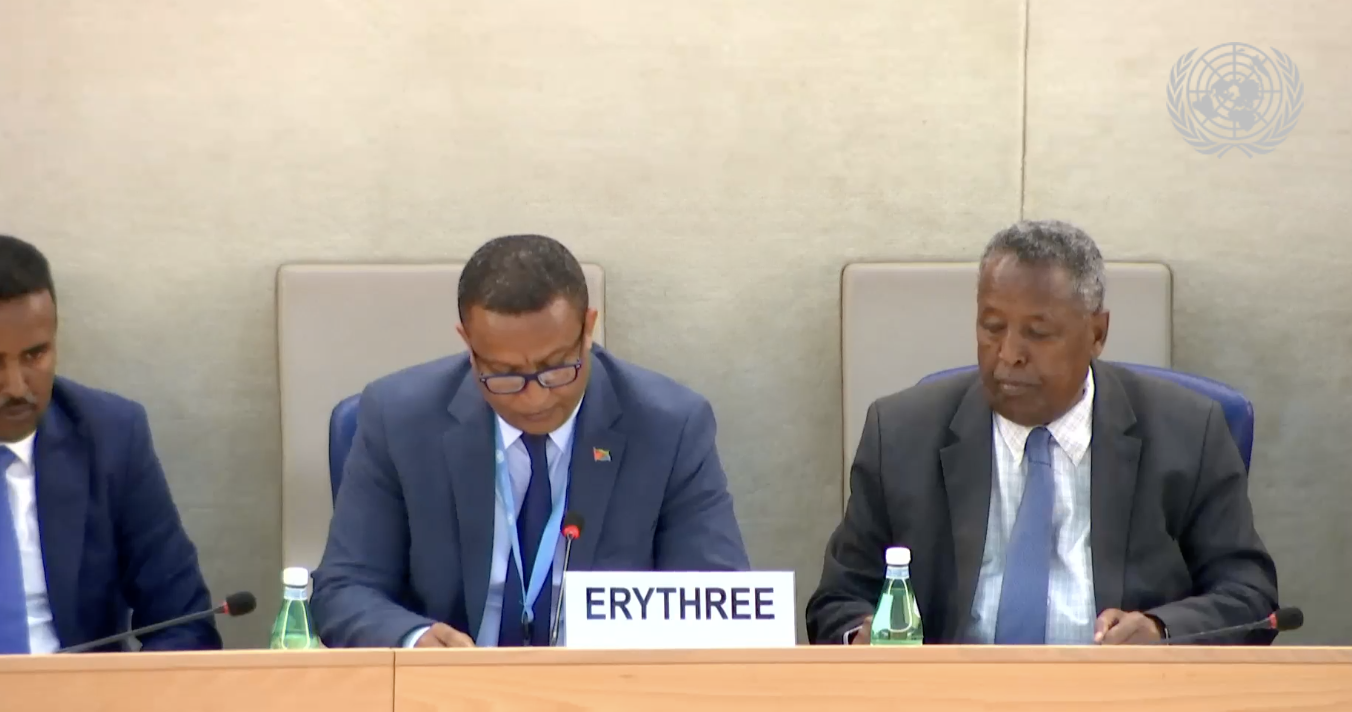
Within his opening statement, Mr Habtom Zerai mentioned that one of the main guiding principles that govern and inform the policies on human rights in Eritrea is the universality, intervisibility, interdependence, interrelatedness, and mutually reinforcing nature of human rights, which includes the right to development. He highlighted that sustainable development is closely linked to human rights and that sustainability is realised only when no one is left behind. Everyone is empowered, which is why Eritrea's view on human rights is people-centred, inclusive, internal, and people-driven. He then went on to discuss the progress made concerning the Right to Health and the Right to Education. The improvements concerning the right to health, to name a few, focused on access to quality healthcare, which led to the construction of health facilities that ensured that 75% of the population now lives within a 5km radius of a health facility. Regarding the right to education, some improvements included equitable access to education in remote and hard-to-reach areas through implementing complementary education and nomadic education while ensuring access to various plans of financial and non-financial support.
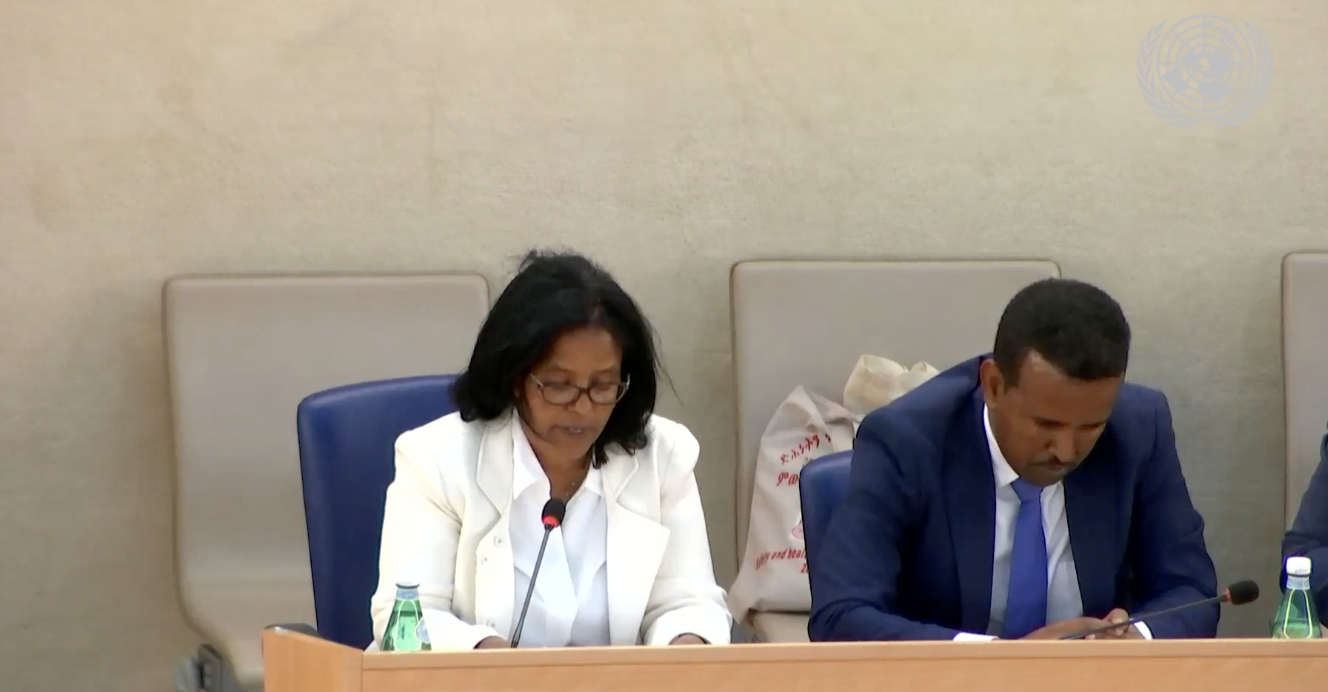
Following Mr Zerai’s statement, Ms Senait Mehari, the Director General of Socio-Economic Services in the National Union of Eritrean Women (NUEW), talked about the vital role the organisation plays in empowering women and ensuring the inclusion and understanding of women in national laws and policies. In her statement, Ms Mehari mentioned that the National Strategic Plan to ensure Children’s and Women’s Rights, abandon FGM/C, and Underaged Marriage 2020 – 2024 emphasises the necessity of comprehensive actions to eradicate harmful practices. At the same time, it advocates for the establishment of strengthened coordination platforms. In addition to the National Strategic Plan, the NUEW has also implemented 26 projects nationwide and has successfully trained women in various disciplines, such as basic computer skills, tailoring, handcrafting, and more, to enable them to start businesses or secure employment.
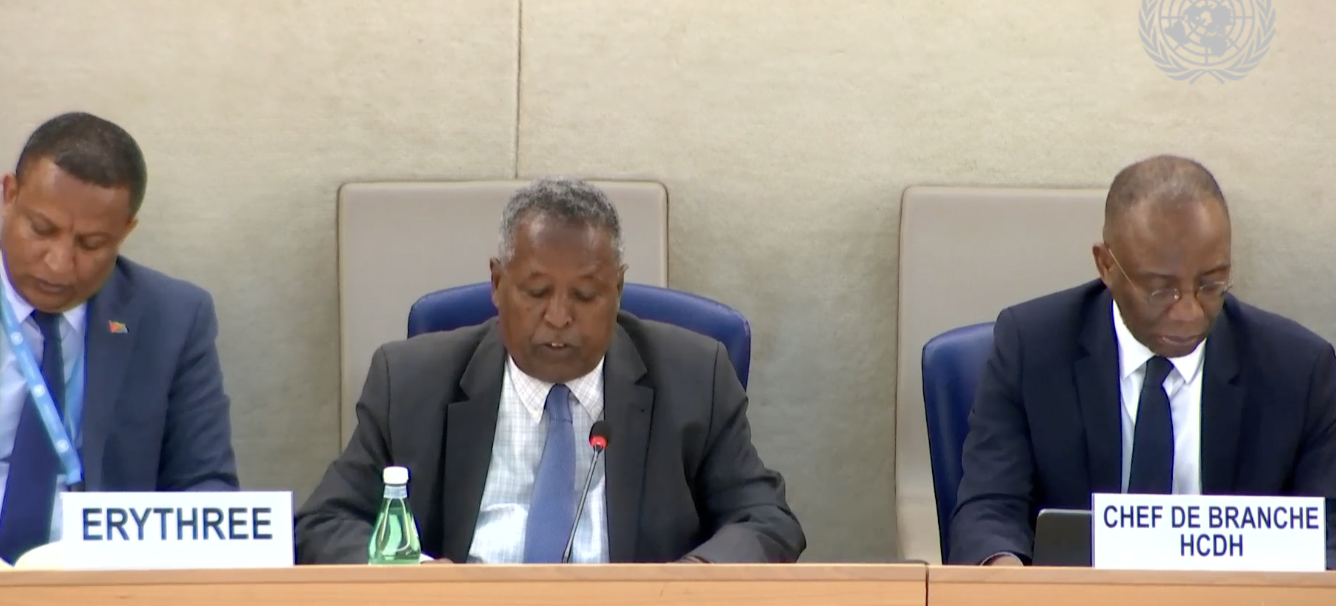
The floor was then given to Mr Mehretab Fessehaye, the Director General of the Department of Social Welfare in the Ministry of Labour and Social Welfare, who explained the progress on the Rights to Social Security, Rights and Welfare of Children, Rights of Persons with Disabilities, and Rights to Culture. On the Rights to Social Security, Mr Fessehaye mentioned implementing short-term benefits, such as severance pay and maternity leave and long-term benefits, such as pensions and disability benefits. Falling in line with the 2021 comprehensive policy for persons with disability, the implementation of disability benefits ensures that there is greater awareness and advocacy for persons with disability, which makes progress in ending stigmatisation within the State. Additionally, Mr Fessehaye spoke about the programs aimed at enhancing the capacity of teachers so that they can be better equipped to teach and understand the needs of children with disabilities. Regarding the Rights and Welfare of Children, there was mention of the elimination of harmful practices, such as FGM, providing financial assistance to children who are living with HIV/AIDS to improve their standards of living, and updating awareness on the violence of children and child labour laws. To conclude his statement, Mr Fessehaye expressed that in terms of the Rights to Culture, there is legislation focused on protecting tangible and intangible cultural heritage for future generations and raising awareness about its importance.
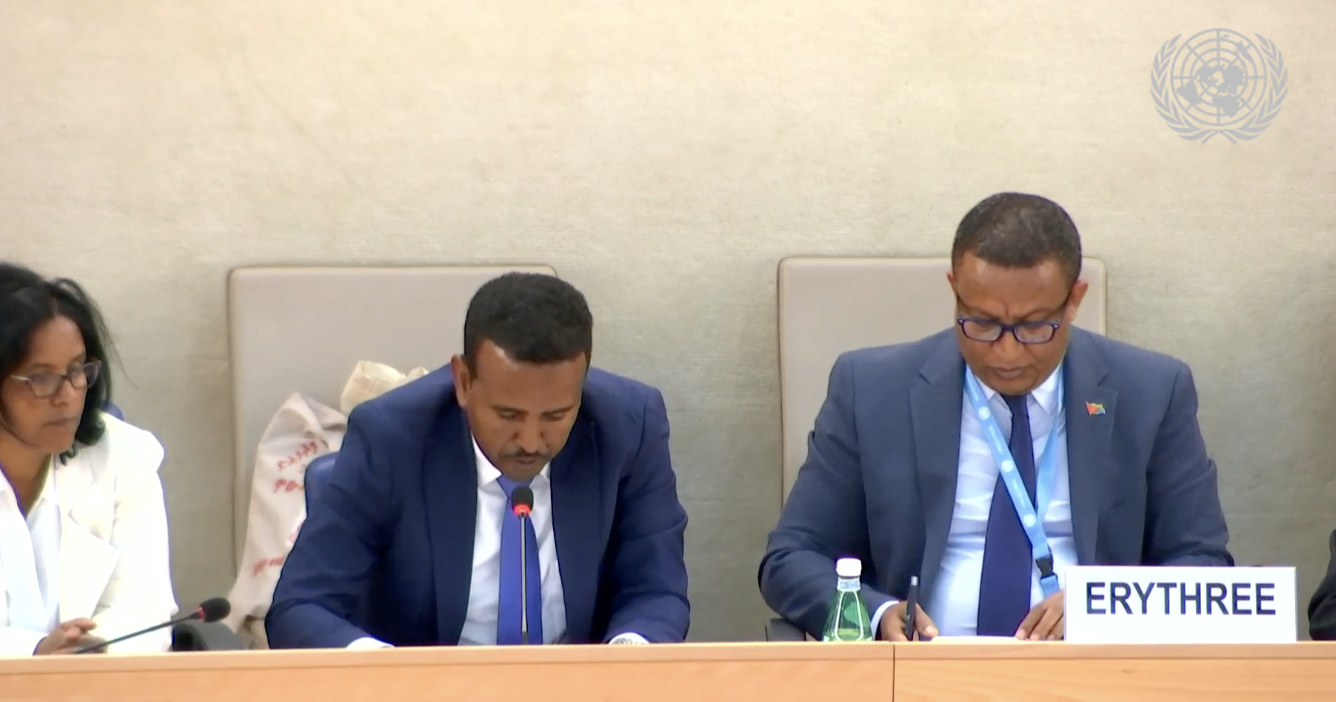
Legal Advisor in the Ministry of Foreign Affairs, Mr Ibrahim Abdu, spoke on Civil and Political Rights, addressing freedom of thought, conscience, and religion under the law. It was stated that within the National Charter of the People’s Front for Democracy and Justice (PFDJ), the national system must be secular and independent from religion while still upholding religious equality. This means that religions and religious institutions have the right to practice their spiritual activities; however, they must not disrupt the peace, security, and unity of the state and its citizens. Mr Abdu then underscored satellite connectivity's progress as new technology has been implemented for faster internet speed and greater reach of people in remote areas. In his conclusion, he remarked that regarding juvenile justice, education programs and counselling are now included to support social integration.
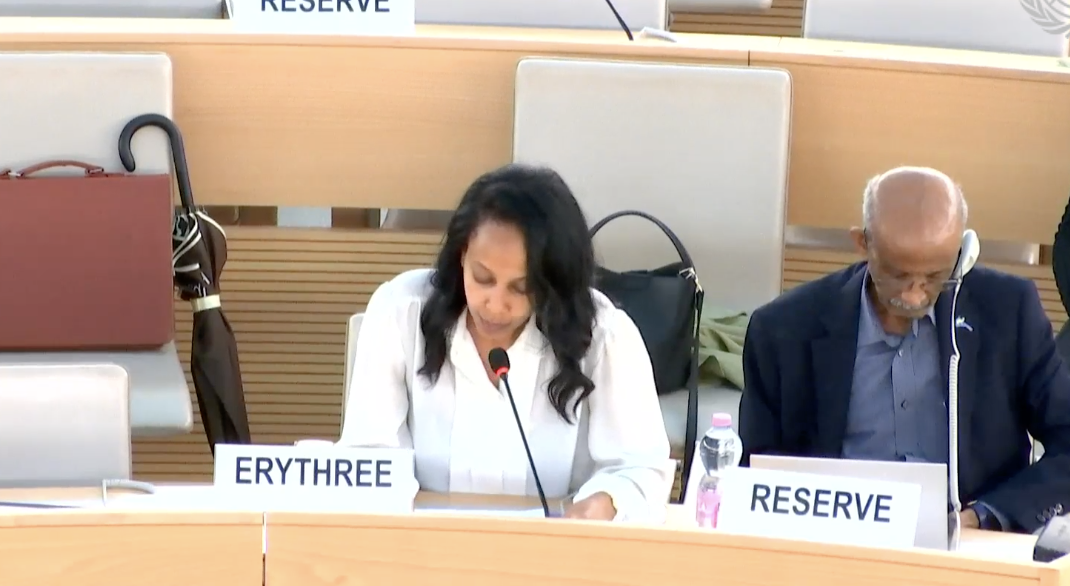
Finally, Ms Nadja Micael, the Senior Human Rights Officer, addressed cross-cutting issues, focusing on the Right to Development, the Prohibition of Trafficking, and Interstate Cooperation. In her statement, Ms Micael explained that Eritrea has a mixed economic model whereby the state and private sectors contribute to national development. The statement also emphasised that Eritrea criminalises trafficking in its Transitional Penal Code under Article 605, with the government actively participating in various international and national initiatives to combat it. Lastly, Ms Micael expressed that Eritrea is actively participating in international cooperation in implementing the 2030 Agenda for Sustainable Development.
Interactive Dialogue
The interactive dialogue consisted of participating countries widely acknowledging Eritrea's positive efforts to improve its human rights situation before proposing recommendations in areas where the State still needs to improve. In alignment with the report prepared by the Working Group of the UPR, the delegations of participating countries put forward recommendations concerning cooperating with the Special Rapporteur from the HRC and international organisations and complying with international standards for the duration of military service participation.
Other recommendations included establishing a moratorium on the death penalty with a future of abolishing it, ending conscription of school-aged children, collaborating with Ethiopia to take accountability for crimes committed, ratifying protocol and investigating all allegations of torture, repealing provisions that restrict freedom of the press to protect journalists, and implementing transnational justice processes to investigate allegations of torture, forced disappearances, and sexual violence.
After listening to the recommendations from the interactive dialogue, the Eritrean delegation addressed the questions asked in advance. They discussed mainly allegations of the crimes committed by the Eritrean Defence Forces (EDF), the ratification of treaties and protocols, the death penalty, and national service.
Response: Allegations of the Crimes Committed by Eritrean Defence Forces (EDF)
One of the points raised during the interactive dialogue and the advanced questions was the crimes committed against Ethiopia at the border for which Eritrea has failed to take responsibility. In response, the Eritrean delegation denied that human rights violations had been committed against Ethiopia because and dismissed such allegations as fabrications aimed at isolating and criminalising Eritrea. The delegation went on to state that during the dominance of The People’s Liberation Front in Ethiopia (TPLF), some southern Eritrean territories were occupied for 16 years until 2018, which was a disregard for International Law and a rejection of the final decision of the Eritrean-Ethiopian Commission of 2000. According to the delegation, the TPLF has continued to manipulate facts and stories, such as the EDF sexually violating women and children, which in Eritrea is culturally and morally condemned and therefore unlikely as the training of the EDF is highly disciplined with strict rules and control.
Response: Ratification of Treaties and Protocols
In response to the blocking of the Special Rapporteur from the HRC and failure to cooperate with international organisations to validate human rights progress on the ground and reform administrative justice, the Eritrean delegation stated that there is an undertaking assessment to determine the visibility and potential impact of ratifying the international instruments within a national context. The assessment aims to ensure compliance with existing national frameworks and institutional capacities. The delegation stated that it is crucial to realise that ratifying treaties and protocols only sometimes guarantee the realisation of their intended objectives. Therefore, effective implementation requires robust domestic legislation, institutions, and adequate resources. While international treaties serve as important guiding principles, the primary purpose of national laws is to safeguard the rights and well-being of citizens, to which the government remains committed while upholding human rights standards.
Overall, the delegation reiterated that it maintains its reservations about specific human rights reports that it views as politically motivated because they are based on allegations and lack impartiality and objectivity, therefore failing to consider the interconnection between peace and security, development, and the challenges the country faces as a young developing nation. The delegation concluded that Eritrea would be willing to engage with international mechanisms if they demonstrated impartiality, objectivity, and respect for Eritrea’s national context.
Response: Death Penalty
The response to the death penalty was brief, whereby the Eritrean delegation stated that the country recognises the death penalty as a form of criminal punishment for serious offences. In line with the administration of justice, the government has strict procedures whereby a prisoner is condemned to the penalty and is waiting for execution. On record, there are only four individuals who have been sentenced to the death penalty, of which only two have been executed.
Response: National Service
Before addressing most participating countries’ recommendations and advanced questions about national service, the Eritrean delegation explained that national service is necessary to mobilise the country’s human forces, build the nation, and protect its sovereignty. Then, they went on to comment that there are many benefits to the national service as it is integrated across all sectors within the country and employs members in all government institutions. In addition, it is also considered an integral part of social integration plans to bring together young people from different regions to foster unity among all citizens regardless of religious background and ethnic groups.
In response to the recommendations to stop the practice of indefinite national service and the conscription of children, which is creating an environment of fear and leading to high levels of forced migration, the delegation informed the participating countries that since 1988, national service has not been indefinite but has been held for 18 months. Then, when speaking on the conscription of children, the delegation stated that both men and women are equally eligible for service provided they are 18 years old and have completed Grade 12 education. Overall, the delegation noted that they felt that the statements made about Eritrea’s national service came from targeted disinformation campaigns that have led to the characterisation of the country’s national service as conscription, forced labour, and slavery.
Position of Geneva International Centre for Justice
Geneva International Centre for Justice (GICJ) urges Eritrea to find a way to work with the Special Rapporteur from the Human Rights Council and international organisations to combat the allegations as mentioned above to ensure a continuation in improving human rights situations in the State. Even though GICJ acknowledges the essential and impactful strides Eritrea has taken towards health, education, and the justice system, it remains deeply concerned that Eritrea has failed to address the allegations of torture, forced disappearances, and sexual violence, as well as the restrictions on the freedom of the press. To conclude, Eritrea should allow for further international cooperation outside the 2030 Agenda for Sustainable Development to continue significantly impacting human rights within its borders and diaspora.
#HumanRights #Eritrea #UPR #SpecialRapporteur #InternationalCooperation #Torture #ForcedDisappearances #SexualViolence #PressFreedom #2030Agenda #SustainableDevelopment #Health #Education #JusticeSystem #GenevaInternationalforJustice #Geneva4justice #GICJ







